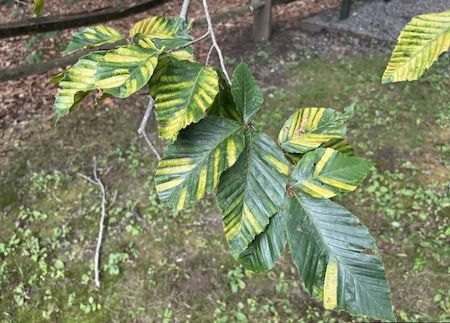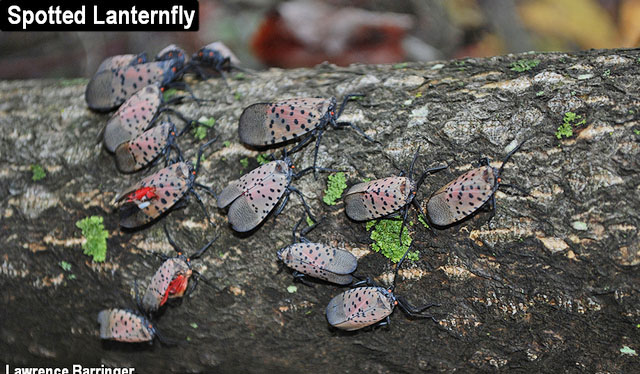Our Plant Clinics Solve Your Gardening Problems
by Elizabeth Cornell Fake, Fairfax Master Gardener
 You have questions and we have answers! Starting the first week in May 2025, our Certified Master Gardener Volunteers and Volunteer Interns will be waiting to help you at the free Fairfax County Master Gardener Plant Clinics located at Farmers Markets and Public Libraries.
You have questions and we have answers! Starting the first week in May 2025, our Certified Master Gardener Volunteers and Volunteer Interns will be waiting to help you at the free Fairfax County Master Gardener Plant Clinics located at Farmers Markets and Public Libraries.
Just look for the white tent or table marked Fairfax County Master Gardeners, and you will find our smiling members ready to give science-based gardening advice. We can help you if you are new to the community and encountering Virginia clay soil for the first time. We have answers for those Japanese beetles and other pests that are claiming your roses, and on the Virginia heat and humidity ruining your vegetable crop. If you have limited mobility for bending and kneeling, we can teach you how to use raised garden beds to grow flowers and vegetables.
Come visit the clinic and find out what they can do for you. Equipped with reference books, internet searches, soil sample kits, turf management brochures and fact sheets, they can help you find out what is happening in your garden and propose a good solution that will work for you. For those with particularly troublesome problems, the Master Gardeners can assist you filling out the diagnostic request forms and delivering your specimens to our Diagnostic Plant Lab. Experts will provide a free service to identify plants, diagnose diseases or pests and give you the answers you need.
Don’t let the summer pass without finding out how our plant clinics can help you.
Gardening Season Begins with Community Garden Plant Clinics
by Pat Dickey, Fairfax Master Gardener
 Fairfax County Master Gardeners host information tables at eight county parks, beginning Saturday, April 12, and continues to September. Garden plot renters, as well as the general public, can visit the tables and obtain information and advice on gardening concerns. Master Gardeners are there to chat with gardeners and answer questions, while seeing problems and concerns in their garden plots firsthand.
Fairfax County Master Gardeners host information tables at eight county parks, beginning Saturday, April 12, and continues to September. Garden plot renters, as well as the general public, can visit the tables and obtain information and advice on gardening concerns. Master Gardeners are there to chat with gardeners and answer questions, while seeing problems and concerns in their garden plots firsthand.
Bring your samples of diseased plants, questions, or photos to be sent to our diagnostic lab for evaluation and research. Plants, weeds and insects can also be identified by bringing samples and completing questionnaires at the clinics. We will report back helpful identification or treatment. Soil test kits and Virginia Cooperative Extension written information will also be available to visitors.
The community garden plant clinic program is a cooperative effort with the Fairfax County Parks Authority, Virginia Cooperative Extension and the Fairfax County Master Gardeners. FCMGA also holds weekly plant clinics from May until September at farmers markets and libraries throughout the county. Check the Plant Clinic page for dates, locations and map. Also find information on the county’s garden plot rental program there.
An Update on Invasives, Fall 2024
by Nancy Miller, Fairfax Master Gardener
There have been two recent developments that may be of interest to Master Gardeners concerned about invasives.
The 2024 General Assembly passed an amendment that has become part of the Virginia Pesticide Control Act, §3.2-3931. This legislation directly impacts unpaid volunteers treating invasive plants on properties owned by local political subdivisions. Unpaid volunteers no longer need to be certified if using nonrestricted herbicides on invasives “with the express authorization of a local political subdivision for the sole purpose of controlling invasive plants or noxious weeds on properties owned by such local political subdivision.” The non-compensated volunteer must be directly supervised by a certified commercial applicator, and the local political subdivision must provide certain instructions. The volunteer does not need to be an employee of the certified applicator. The volunteered hours can count towards the required 40 hours to earn certification as a registered technician.
The second big announcement is that thirteen species have been added to the Virginia Invasive Plant Species List, maintained by the Virginia Department of Conservation and Recreation. While this list has no legal authority, please keep in mind that these plants cause economic and ecological harm to our landscapes. Choose your plants wisely!
Beech Leaf Disease Threatens Fairfax County Trees
by Pat Dickey, Fairfax Master Gardener
 Our American Beech trees (Fagus grandifolia) are in danger of a new mysterious disease that has recently reached our parks in Fairfax County. A tiny roundworm (Litylenchus crenatae mccannii), a parasitic nematode, appears to be the culprit. Urban forest experts have been working together to determine how this nematode originally came to our country and what can be done to stop its infestation.
Our American Beech trees (Fagus grandifolia) are in danger of a new mysterious disease that has recently reached our parks in Fairfax County. A tiny roundworm (Litylenchus crenatae mccannii), a parasitic nematode, appears to be the culprit. Urban forest experts have been working together to determine how this nematode originally came to our country and what can be done to stop its infestation.
Beech Leaf Disease was first seen in Ohio back in 2012. Recently, in May 2022, traces of the disease were discovered in Burke Lake Park in Fairfax County. Since then, additional infestations have been found in Fountainhead Regional Park in Fairfax Station and in Hemlock Overlook Park near Clifton.
The big question is how did the nematodes come to Virginia while skipping neighboring states? Where did they originate? Right now, the thought is that the nematodes came from Asia by global commerce, on planes and ships. After they arrived, they probably were spread by wind and rain, or by insects and birds, or by all of these ways.
When the disease infests beech trees, it is easy to spot the dark bands along the veins of the leaves. You can see the disease by looking up through the tree’s canopy. The nematodes feast on the leaves and buds of the trees as a source of nutrients, and the leaves thicken and curl, turning brown and brittle.
There are around 4 million beech trees in Fairfax, and it would be devastating if they were lost to this disease. Luckily, the disease is fairly new here, and there is still time to solve its mysteries. Right now, there is no treatment to slow down the disease, but scientists are testing possible solutions. Scientists need our help in finding new areas in Fairfax where this disease has spread.
Use the app from iNaturalist to report any signs of beech leaf disease. Record observations and take several photos. Describe the area where the disease was seen so that others can determine the location.
Online webinar on Beech Leaf Disease.
Be on the Lookout for the Spotted Lanternfly

Spotted lanternfly on tree branch
A potentially very serious pest, the Spotted Lanternfly was first sighted in Frederick County, Virginia in 2018. With the growing season approaching, we need to be on the lookout for their egg masses that survived the winter cold. They can live in temperatures below 0 F. Eggs hatch in late April and early May. Nymphs have four developmental stages, or instars, and adults will appear in July.
We have included a link below from Virginia Cooperative Extension with information about their appearance at each developmental stage, where to look for them, and what to do if you see them in your landscape. Check Tree of Heaven (Ailanthus altissima), their favored host tree, and grapevines (Vitus vinifera), in particular. Contact the Fairfax Office of VCE to report any sightings.
Spotted Lanternfly in Virginia, Virginia Cooperative Extension